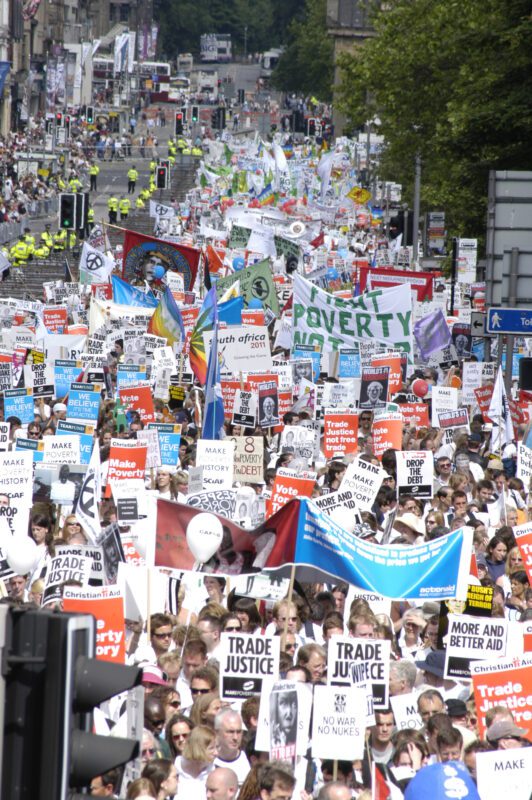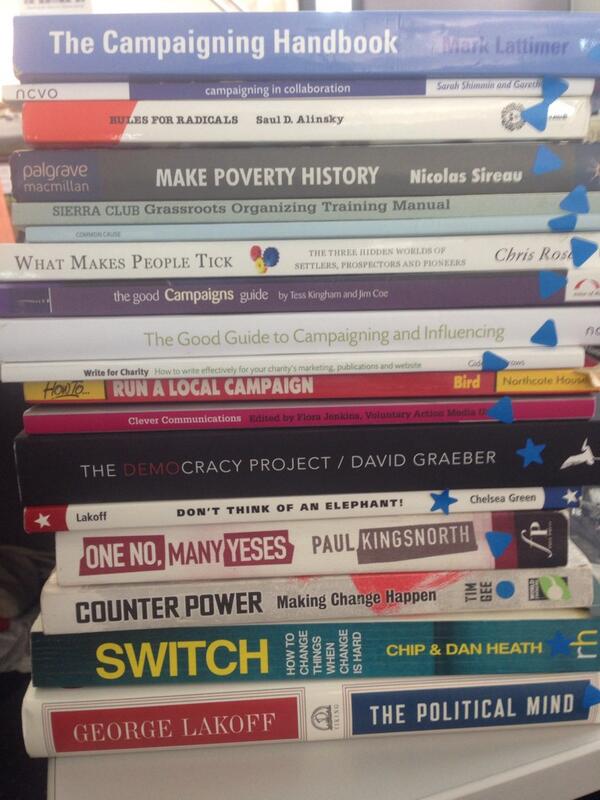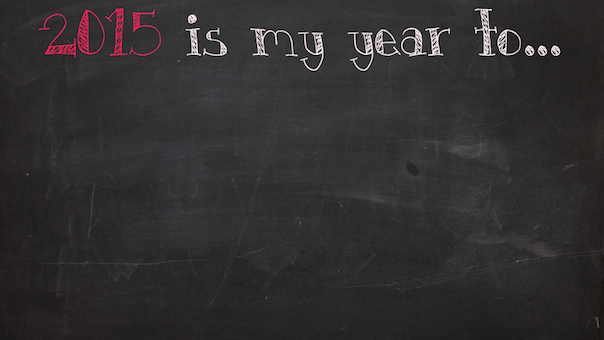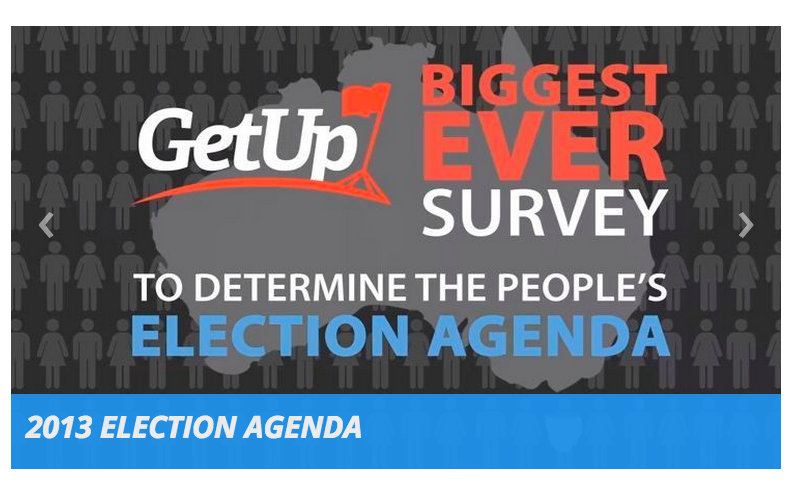I love working in coalition (which is perhaps why I’ve ended up working at Bond!).
I’ve lost count of the number of coalitions that I’ve been involved during my campaigning career, but from End Water Poverty, to Make Poverty History, via Turn Up Save Lives. I get a buzz from bringing people together to achieve more through our shared endeavours that we can achieve on our own (h/t the Labour Party membership card!)
But ask most campaigners about working in a coalition and you’ll normally experience a sharp intake of breath before being regaled with some horror story of the challenge of working with others, but it doesn’t have to be like that!
Here are a few tips I’ve found helpful;
Build relationships – throw any group of individuals together for the first time, that doesn’t mean you need to become best friends with everyone in the coalition, but taking time to get to know people, what’s brought them to this work, what makes them tick will always accelerate the effectiveness of your coalition.
Trust matters – research shows that the most effective coalitions where those involved experience high degree of trust. It’s not easy to build trust quickly, it comes through working together, going through adversity, pulling off the unexpected, but healthy coalitions are ones where those involved trust each other.
Be clear on the structure you need – there are a huge number of ways you can go about structuring your coalition, but finding a model that feels like its going to work really helps. With Turn Up Save Lives we’ve found that an informal coalition has been all we’ve needed, but in other campaigns a more formal structures has been really helpful. And remember, that the model you start with can change during the lifespan of your coalition!
Keep perspective – It can be easy to read too much into the actions of others in a coalition, and see every action as part of a vast conspiracy theory, sometimes its is, but my experience that more often than not that’s not the case. More often than not its a mistake than a conspiracy.
Build a diverse coalition – this is a mantra that’s been drummed into me from the first campaigns I was involved in. Diverse coalitions that bring together people or organisations who don’t normallly work together have impact. Remembering that by working together in a coalition doesn’t mean you have to agree on everything else you do.
Make it easy to collaborate – most people coming into your coalition are already busy, so finding the tools that help facilitate this really help. Setting up Google Groups is often a brilliant way of doing this, having regular conference calls (I use PowWowNow a lot!) and if possible getting people together in person.
Find the coalition builders – We exist, we’re often the people you’ll spot trying to make connections between different people or groups or who will pick up the action points that no one else is keen to take on. Make sure you’ve got a few of us involved in your coalition from the start!
End it when it needs to end – too often coalitions keep going because ‘thats the way we’ve always done it’. The most effective coalitions I’ve been involved in have clear review points, and end when it’s time to end. Again if your coalition achieves its original aim doesn’t mean you can’t form a new coalition for the next stage!
You might also be interested in this post – Working in coalition – learning from the last 10 years.
Category: learning
Questions campaigners should ask regularly
Been challenging myself to ask more questions. Here are a few I think I should be asking more often.
1 – What does ‘success’ look like? A fundamental question to ask regularly. The answer should have both a specific and detailed response, as well as a reflection on what you want your campaign to achieve in the long term.
2 – What has the real influence here? Who can deliver the change we want? Its easy to focus on campaigning towards a target we feel comfortable with, or we’ve approached before. A through power analysis should be central to any campaigning we do, and from that an informed strategy. I’ve always thought that the right target is whomever can wake up tomorrow and deliver your campaign ask.
3 – What do you really need from us? A question any organisations with resources should ask to those within its movement, campaigns often succeed because of the variety of voices working on a issue. Sometimes that’s in formal coalitions, where resources are distributed in formal ways, but even in more informal coalitions, ensuring that others partners in your movement have what they need is essential. The answer isn’t always money, sometimes its political insight, sometimes its practical resources or access to technology.
4 – Do we really need to campaign here? This might sound like a counter intuitive question, but launching a campaign should be a tactic if other more ‘insider’ approaches aren’t going to work, rather than an initial response. Why? Campaigning comes at a cost, it’s resource intensive, and often the success we’re looking for can be delivered by a well placed ‘insider’ interventions.
5 – What would we do with twice the resource? All campaigns operate in a resource scarce environment, where their are trade offs to be made, asking this question is a great way of checking that you’re allocating the resources that you do have the most efficient and effective way. If you’d do more on one thing that you’re already doing, then perhaps you should look to redistribute the resources you already have.
6 – What are we learning? What would you do differently next time? Finding time to evaluate in the midst of a campaign isn’t always easy, but by asking what you’d do differently helps to ensure future campaigns win. Planning times for quick evaluation should be at the heart of any campaign.
What questions would you add?
Campaigners #Shelfie – 6 books that should be on your reading list.
I’m often asked for suggestions of books campaigners should read. I could list hundreds, but here are 6 that I’ve found particularly useful in the last year. I’d love your suggestions and additions.
1 – The Power of Habit – you might be groaning under the weight of books available from authors like Malcolm Gladwell or Nate Silver. I’ve read far too many of them, but I found Charles Duhigg book is one of the most helpful. His book is full of insight about what makes us change our actions, and has a fantastic chapter on why Rosa Parks was successful and how movements start because of the social habits of friendship and grow because of the habits of a community. It’s also helpful if you’re trying to keep a new years resolution!
2 – Victory Lab – I’ve written before about why I think all campaigners should keep a close eye on what’s happening in the US to learn about approaches. Sasha Issenberg book is the best look at the data-drive approach that has been adopted across US politics. It’s a brilliant look at how the Obama campaigns and others have adopted microtargetting, testing and audience insight. Campaigners in the UK have much to learn on this and this book is a great introduction.
3 – A View from the Foothills – Campaigning is political, and its vital that every campaigner has a good idea of how politics work. To be honest, I’m sometimes time surprised about the level of political literacy that exists amongst some campaigners. if we want to win campaigns we need to know how the institutions we’re targeting operate. Chris Mullin’s diaries of his time as a MP and junior minister are one of the best reads out there, but you wouldn’t go wrong reading Alistair Campbell’s diaries either.
4 – Made to Stick – looking for ideas about how your communications can get traction, what the top brands do to ensure that you remember their adverts, then you need to read Chip and Dan Heath’s book. Its a practical, full of great illustrations and the principles will stick with you as you design your next campaign messaging.
5 – The World Is Not Ours to Save – this is a personal choice that I’ve found really helpful over the last year. Although its primarily written for faith-based activists, the premise of the book, that as activists and campaigners we need to recognise our limitations, and ensure we build in habits that allow us to rest and be refreshed is one I’ve found really helpful as I’ve been thinking about how I sustain a long-term career in campaigning. If you don’t find Tyler Wigg-Stephens book for you, perhaps try other authors who’ve written about spirituality and activism.
6 – How Organizations Develop Activists – A late entry into my list, but I adore this book. Hanhrie Han has done the legwork to work out why some grassroots groups succeed and others fail. I found myself changing from nodding in agreement to furiously scribbling down insight from Han’s study of two unnamed organisations in the US, for anyone who wants to think about how they can build a flourishing grassroots network . A good summary of why it works (or doesn’t) here and this by Jim Coe is a fantastic summary.
Read, Reflect, Get a Mentor, Plan to Rest – 4 resolutions to make your a better campaigner in 2016
Originally posted in January 2015 but still relevant for 2016!
I’m terrible at keeping new year resolutions (if you want a campaigner who takes them very seriously check out Oxfam’s Al Kinley), but I’m a big fan of using the start of a new year to try to build new habits.
So as you get back into the office here are a few thoughts about steps that you could take to be a better campaigner in 20156.
1 – Read. A wise person once said to me that ‘leaders are readers’ its a maxim that’s stuck with me, and is part of the motivation for this blog.
In20156, make time to read about campaigns that are winning, trends that will impact your campaigning (Mobilisation Lab is a good place to start (and hopefully this blog)), what’s going on in politics (as a start sign up for daily emails from Labour List, Conservative Home, Lib Dem Voice plus Times RedBox) and be inspired by campaigners from the past.
But don’t just read things you agree with, take a moment to follow blogs and read newspapers that put alternative perspectives across. Don’t assume that everyone thinks the same as you and your colleagues, they don’t. Believe it or not, you could be a better campaigner by reading the Daily Mail.
2 – Reflect. When I started my new job in July, I penciled in my diary to take the forth Friday afternoon of each month to escape my desk and spend a few hours reflecting on what was working and wasn’t working. It hasn’t happened, although I’m going to try again in20156 with a less ambitious fortnightly lunch slot!
In campaigning, it can often feel like a luxury to take an hour or two to reflect and review on the last week, fortnight or month, but research shows that reflecting on performance actually improves your work. Why not start the year by booking in 30 minutes every 2 weeks to reflect on the following questions;
- What is your campaign doing well and what should you continue to do?
- What is your campaign doing ‘okay’ or badly and what can it improve?
- In what ways has your understanding about the situation deepened or changed?
- What have your learnt in the last fortnight? What areas are you being stretched in?
3 – Get a mentor. I’ve really valued those who’ve invested time in helping me be a better campaigner. I’ve found meeting with someone on a regular basis, about once every 4 to 6 weeks for an hour or so over coffee, has really helped me in my career. I find a mentor is someones brain I can mine for ideas, someone who can help me see the bigger picture or coach me through a particular challenge I’m facing.
It can feel intimidating trying to identify a mentor, it could be someone more senior in your organisation (probably in a different team), a campaigner you admire or someone working in a related area you’re keen to deepen your experience in. Start out by suggesting you trial it for 3 months and take it from their, you’ll be amazed that people like to say yes when you ask them
4 – Plan to Rest. You might feel rested after a Christmas break with a few long lie-ins and quiet days, but book your next break now, and make a strategy for how your going to switch off from your work over the next year. We need you to be involved in the work of delivering social change for at least the next 12 years, not just the next 12 month, and sadly too many of us burnout. I love these resources from the team at Plan to Thrive, I can’t commend this article from Rockwood Leadership enough on how to develop good habits to avoid burnout and I’m a big fan of encouraging everyone to take a retreat.
14 great reads for campaigners from 2014
Settle in with a cup of tea, here are 14 great reads (in a rough order of how much I enjoyed them) that I’ve shared during 2014 that a worth a read.
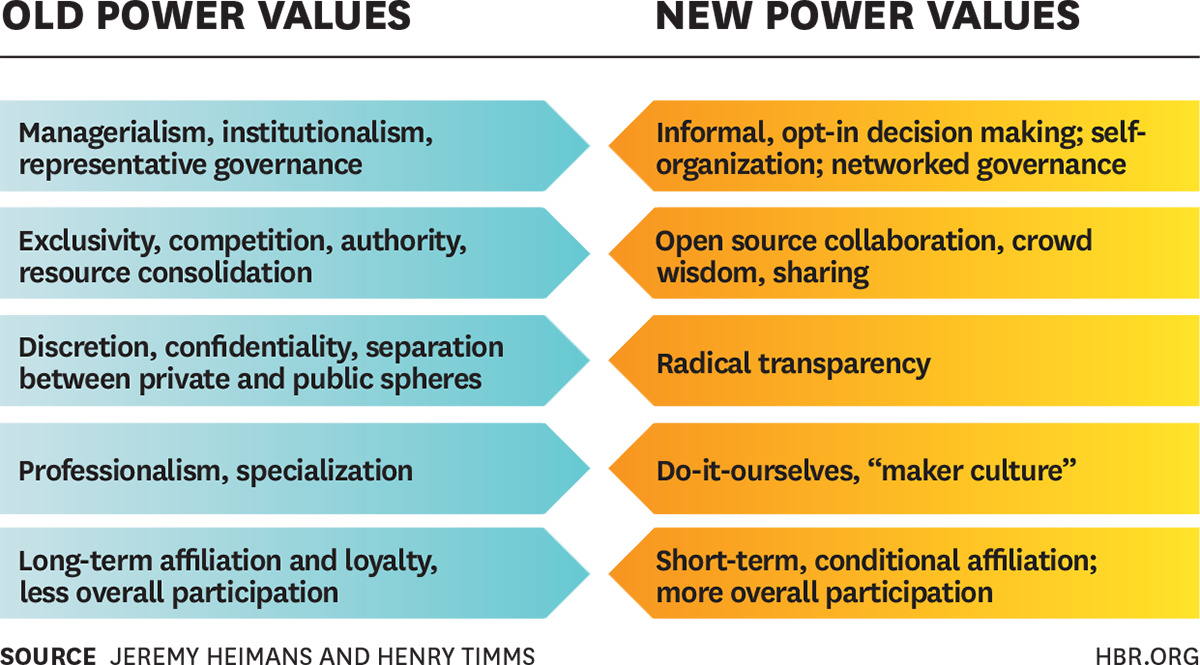
1. Understanding New Power – brilliant from Jeremy Heimans and Henry Timms on how the world is changing. A must read (great summary in the graphic above).
2. Changing Trends: New Power, Neuro-Campaigning and Leaderless Movements – just love this paper on key campaigning trends from Hannah and Ben.
3. Purpose Driven Campaigning – 40 key principles for growing social movements drawn from Purpose Driven Church.
4. When the pillars fall — How social movements can win more victories like same-sex marriage – brilliant look at how same-sex marriage advocates in the US build a movement to win.
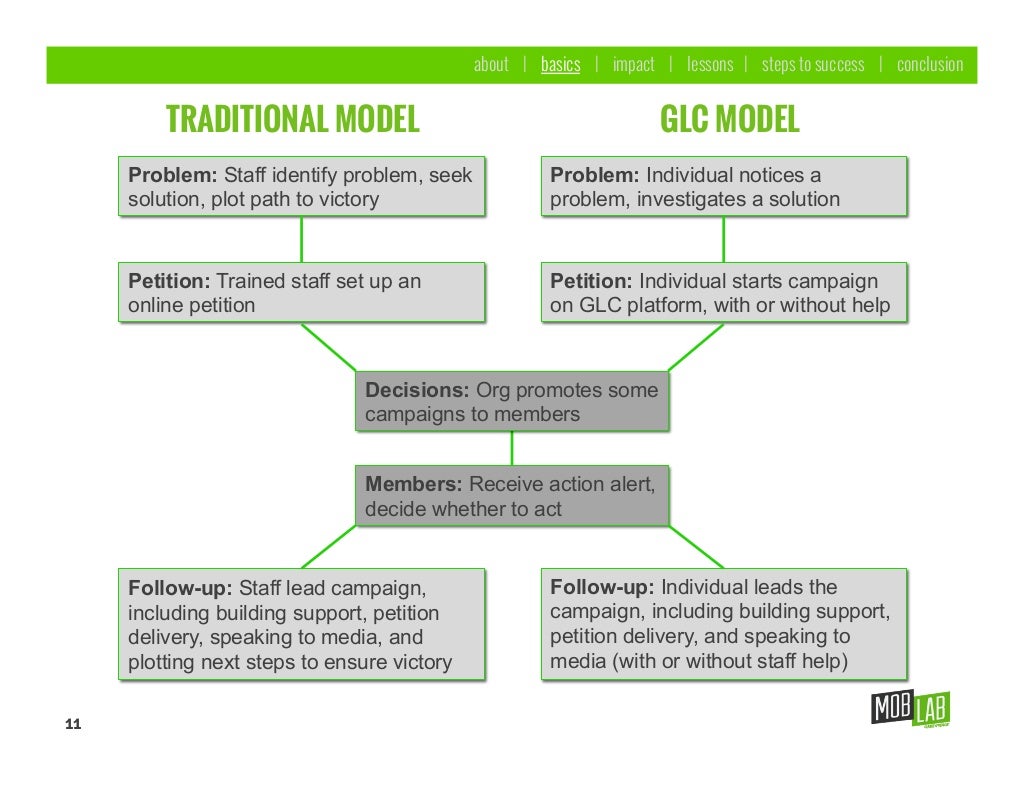
5. Grassroots-led Campaigns: Lessons from the new frontier of people-powered campaigning – brilliant MobLab report full of wisdom and insight of the people at the cutting edge of grassroots-led campaigns (GLC model in the graphic above). Basically anything MobLab writes is brilliant.
6. From fired up to burnout: 7 tips to help you sustain a life committed to social justice – offered without comment.
7. 6 things today’s breakout campaigns get right – great insight from the always brilliant Jason Mogus
8. “More of an art than a science”: Challenges and solutions in monitoring and evaluating advocacy – also enjoyed this by Jim Coe.
9. Stonewall’s secrets of successful charity lobbying – top tips from one of the best (also learning from Greenpeace here).
10. From Petitions to Decisions – how change.org is continuing to innovate.

11. Inside the Cave – a look at the digital and technology behind the Obama 2012 campaign (and here is more on how the campaign used twitter)
12. The Art of Coalition Campaigning – brilliant set of reflections from Ben Niblett.
13. 14 lessons from the Scottish referendum – useful reflections from the UK political event of the year (more here)
14. Rage Against the Machine – Lessons from Guzzardi–Berrios Race – how a 26-year-old former journalist organised to get elected in Chicago. Great lessons about working with the grassroots (and here on how to lose your seat when your a high-profile US politician).
Looking 'down under' for campaign inspiration
When it comes to 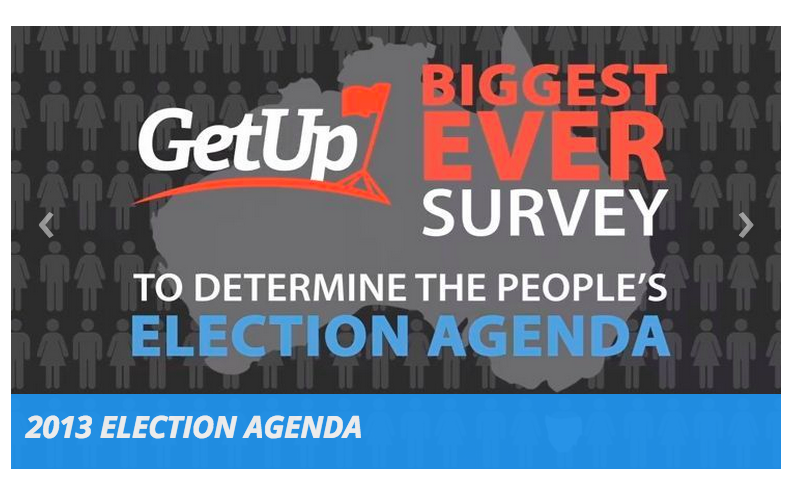 elections, campaigners in the UK get very excited about the one happening ‘across the pond’ in the US.
elections, campaigners in the UK get very excited about the one happening ‘across the pond’ in the US.
I’m one of them, and even 6 months later give me an article on data driven campaigning that helped Obama to win and I’ll be the first to read it.
But is it time for us to stop looking west for campaign inspiration and instead start looking ‘down under’?
The Australian elections might not have the glamour of the US but in many ways the comparisons between our political systems are closer, two main parties but plenty of feisty smaller ones, a constituency system with the leader of the biggest party in Parliament forming a government and an active campaigning sector.
While there are clear differences, most notably in Australia voting is compulsory, any smart campaigner could do worse than follow the soap opera down under for the next 4 weeks ahead of the polls on 7th September to get some clues about how we might plan to influence the 2015 election here in the UK.
Here are 3 things that have already caught my eye in recent days;
GetUp! Live Webcast – The Australian equivalent of 38 Degrees are, as expected, making a big deal of the elections. I’m sure we’ll see lots of new ideas from them in the coming weeks, but I love how they’re starting by hosting a nightly weekly live webcast for their supporters to bring them the latest on what they’re doing and how the community can get involved (you can watch at 9.30am here in the UK).
Learning from failure – The Centre for Australian Progress is playing a key role in coordinating groups and organising war rooms to help bring campaigners together. They’ve already planned to organise a FailShare to bring together groups that have been involved in campaigning around the election to learn from what didn’t work. The appetite to learn from what didn’t work as well as what did is brilliant.
Engaging the grassroots – I’m biased on this, because I’ve been working with groups like Micah Challenge Australia for a number of year, but as well as the exciting and responsive digital campaigning, development groups have been coming together to form ‘Movement to End Poverty‘ with the aim of getting the issue of development aid on the agenda of the parties, focusing on local events as well as petition signatures.
I’ll be keeping an eye out from other campaign lessons from Australia in the coming weeks. Do share what you’re discovering.
What I learned at Campaign Bootcamp…
Last week was one I won’t forget in a long, long time. Together with a group of wonderful friends, I helped to organise and run the first every Campaign Bootcamp (the video below shows a little of what we got up to).
[youtube=http://www.youtube.com/watch?v=YlnC_ImKfbY&w=560&h=315]
It was a dream that took almost a year to bring together, and is one of the main reasons that this blog has been so quiet in the last 6 months!
The idea was simple, take 30 of the most talented and energetic emerging campaigners committed to building a more just, fair and sustainable country from across the UK and give them a week of training from some of the very best in the campaigning business, but also allow them to put those skills into practice in real-time.
We had so much fun, and I’m incredibly excited about what we’ve started, but being at Bootcamp also taught me some invaluable lessons that I think might be useful for other campaigners to reflect upon.
1 – Let’s talk about power. It’s all too easy to dive right into learning about exciting new tactics. But we devoted the first day to understanding power and how change happens. It’s an issues I know that is a critical part of any training you might do with those involved in community organising, but something that I know I’ve been guilty of rushing over when I’ve run campaigns training before. Ensuring every campaign has a clear and robust theory of change is critical, but something we perhaps incorrectly leave to those who are more senior or have greater experience.
2 – Practice makes perfect. One of the central components of Bootcamp was running a scenario which participants had to run a campaign on. In real-time they we’re expected to write emails, build websites and consider how they should adapt their strategy to changes in the scenario.
Some might see it as a giant game, but last week I saw it as an invaluable way of learning how campaigners react and respond under pressure. I saw it teach valuable lessons, and would encourage any campaigns team to put time aside to learn from the experience and ‘stress test’ there systems and structures before a real campaigning example does.
3 – Being deliberate about building community. Nothing builds a sense of community like going away together for a week. Now that might not always be possible but the value of eating, learning and relaxing together, rather than all packing up at 6pm each day and heading our separate ways built a real sense of community. As a team we were also deliberate about wanting to ensure we had a cohort of participants from across different campaigning communities together. It stuck me of how often campaigning happens in silos here in the UK.
4 – We need to teach the habits of highly effective campaigners. It would have been easy to fill the programme for the 6-days with learning on strategy and tactics, but as a team we wanted to put aside time to ensure that those attending left with habits to ensure they’re brilliant campaigners in 20 years rather than burnt-out ones. We didn’t always get the balance right (11am finishes anyone!) but I think everyone walked away with ideas and strategies to keep running the campaigning race for years to come.
5 – Everyone needs to learn code. For an afternoon, it felt like being back at school again, everyone in rows like in a classroom, laptops out and a teacher at the front as we followed exercises to help us learn HTML. It’s easy for many campaigners to assume that someone more technical can worry about the code, but with the web and email being key tools for our campaigning, having a basic understanding of HTML is a key skill to learn. I’d recommend Code Academy as a good place to start. It turns out that many of the problems can easily be solved with just a little expertise!
6 – Our sector is a hugely generous one. Throughout the week I was overwhelmed with the generosity we saw from existing campaigners. From sharing time as trainers and coaches, to donating money to joining our seed list and providing feedback on the emails that participants sent we experienced extreme generosity from others. It was something quite phenomenal and very special. Thank you to everyone who supported us in so many different ways.
I know that I won’t be able to recreate that Bootcamp feeling again any time soon, but the lessons that I learnt along with the amazing energy that the participants I hope will stay with me for a long time.
Can campaigning help fundraising?
In my work, I’m often asked can campaigning help an organisation with fundraising? I’ve always replied ‘yes’, based on a belief that advocacy campaigning can be useful in;
- Helping to recruit new supporters into an organisation – especially at a festival or other event where making a financial ask can be seen as a ‘high barrier to entry’.
- Differentiating the asks we make of supporters – so we’re not always asking them to give us more money.
- Building loyalty of our organisation and reducing the attrition rate.
 But it’s not always been based on much empirical evidence to prove the point.
But it’s not always been based on much empirical evidence to prove the point.
The reality is that is doesn’t appear that we have a huge number of examples or studies to draw upon, but here are three studies that all provide evidence that campaigning is good for fundraising.
1. National Bureau of Economic Research Working Paper.
Andreas Lange and Andrew Stocking in this 2009 Working Paper found that from a sample of 700,000 supporters of a large US advocacy organisation, that a person who takes an online advocacy action for your cause is seven times more likely to donate, compared with someone who does not take an online advocacy action.
2. PETA France.
Working with Engaging Networks, PETA France demonstrated that advocacy is an effective way to engage lapsed donors. They sent out various emails on the issue of seal clubbing to a total of 22,000 supporters.
As well as finding a correlation between level of activism and response rate, the more active the campaigner, the better the response rate. They also found that lapsed donors were significantly more likely to donate if asked to take action first then donate.
3. Greenpeace
Again working with Engaging Networks, found that directly integrating campaigns with donation pages as part of their Arctic campaign lead to a 1.23% response rate, compared to providing a donate link on the thank you page of the campaign action led to a best ever response rate of 0.4%.
What other studies or examples have you found to demonstrate the links between campaigning and fundraising?
Can 'Theory of Change' transform our campaign planning?
To be honest, I’ve struggled to get my head around the ‘Theory of Change’ approach that I’ve seen being talked about across the sector over the last year.
I’ve felt that its something that could be an incredibly powerful tool, but found it’s been hard to really understand of it.
In an attempt to understand it, I attended a Breakfast Briefing organised by NCVO with Brian Lamb last month. Brian has been a leading proponent of the approach for use in campaigning and wrote this report which I blogged on last year.
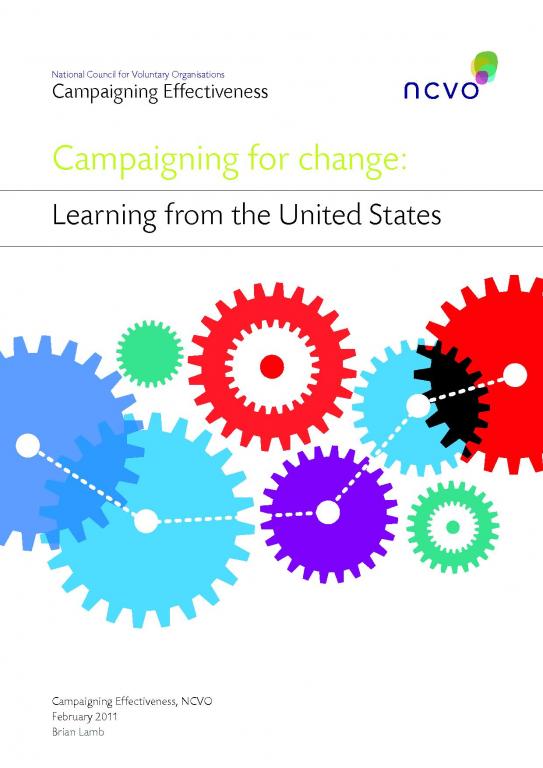 Hearing Brian talk through how campaigners could make use of Theory of Change was really helpful at bring the theory behind the tool found in various reports and guide that I’ve read to life.
Hearing Brian talk through how campaigners could make use of Theory of Change was really helpful at bring the theory behind the tool found in various reports and guide that I’ve read to life.
I came away from the time enthusiastic about if for the following reasons;
1. It get’s us to question our assumptions – One of the central features of the approach is to get you to name and provide evidence for the assumptions you’re making that lead you decide that the impact a certain input will have
I’ve long thought that we need to more to justify the decisions that we’re making between impact and outcome, and Theory of Change actively encourages you to do this, demanding you to list your assumptions and discuss why you’ve made them.
In doing so, I think its likely to force us to ask the question, what are the ‘most effective approaches I could use’ as opposed to ‘what existing tools do I already have that I need to use’.
2. It builds from impact up – The first thing that the approach asks you to do is to decide on the impact of your advocacy, this is defined as ‘the ultimate effect on the lives of those you’re seeking change for’.
Brian suggested that while this might sound like a straight forward question to answer, it often takes groups considerable time to come up with the answer to the question, but in doing so they help to reach common understanding of the change they’re seeking.
I know I’ve been in campaign planning sessions before where we’ve spent the majority of our time on agreeing a strategy to reach a policy solution; as opposed to asking what impact we want to that solution to have.
3. Provides clear building blocks – The approach is simple and logical. Working upwards from impact, to mapping 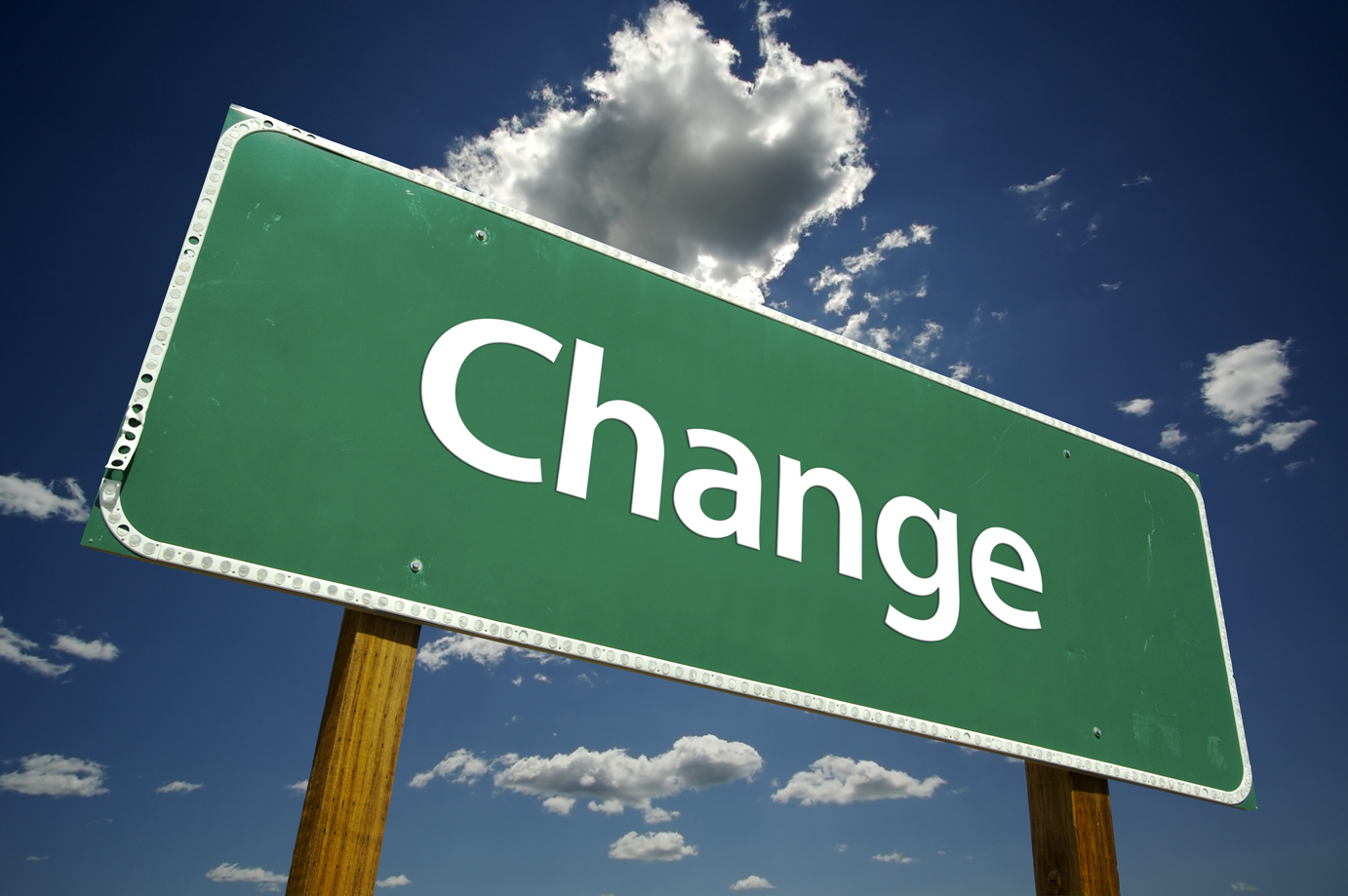 the strategies that will be needed to achieve this, to looking at the outcomes needed from activities to achieve this, to looking at the activities that will be required at the heart of the campaign.
the strategies that will be needed to achieve this, to looking at the outcomes needed from activities to achieve this, to looking at the activities that will be required at the heart of the campaign.
Also, because the built, there are lots of existing tools that already exist that can be used to help to guide our theories of change. In the session, Brian shared the work of the Harvard Family Research Project which has undertaken extensive research to identify a number of common approaches to policy goals and activities/tactics. Great source materials to help in campaign planning.
4. Gives us a common language – At the heart of the Theory of Change approach is the need for dialogues and discussion to reach conclusions. In the use of approaches like ‘so that’ chains (where you need to articulate a logical path between the steps you’re suggesting).
Throughout the process it provides opportunities for campaigners to clearly articulate their approach, but also invite others to test and question the logic. I can see how this is really helpful in unpacking the ‘mystery’ of our campaign planning to others, and helping to answer the hard questions
5. Helps to think about the best ways of allocating resources – You’re required to put all the outcomes and activities on the table in the process, rather than selecting those you think possible with the resources that you have.
Doing that means you can look afresh at how you might resource new approaches, or think creatively about new alliances to forge. The research also has some invaluable ‘checklists’ about what an organisation needs to have the capability to undertake effective advocacy.
My conclusion. That its worth investing the time into grappling with Theory of Change because it’s got huge applicability to campaigning and that its great to find someone to help work you through an example of the approach in person.
Five for Friday – 28th September
Five great articles on campaigning and social change that I’ve spotted over the last month.
1.Innovation a process, not a destination. A thoughtful look at innovation in social change from Stamford Social Innovation Review –
2. Great best practice article from the Mobilisation Lab – How Greenpeace Brasil built the movements biggest twitter following.
3. I didn’t put together a summer reading list this year, but thankfully Casper ter Kuile has.
4. How did the ODI thinktank build a winning online communications strategy – lots of useful and practical lessons for those wanting to get research noticed.
5. In Praise of Advocacy Amateurs – another challenging piece by Kirsy McNell over on Global Dashboard.
